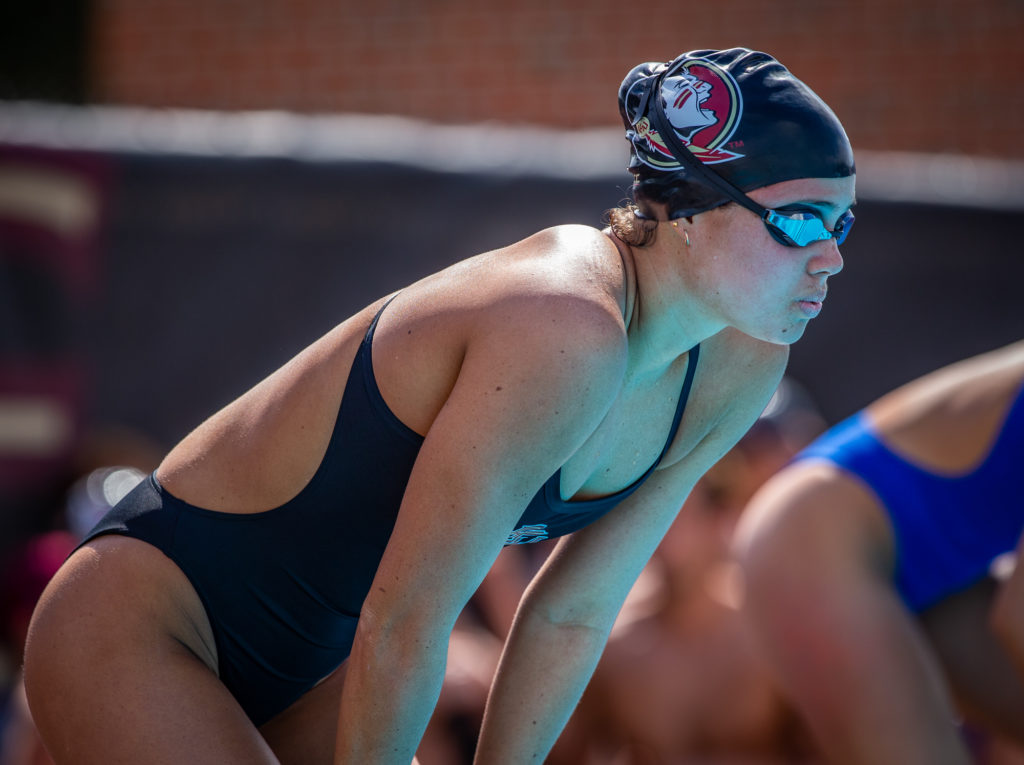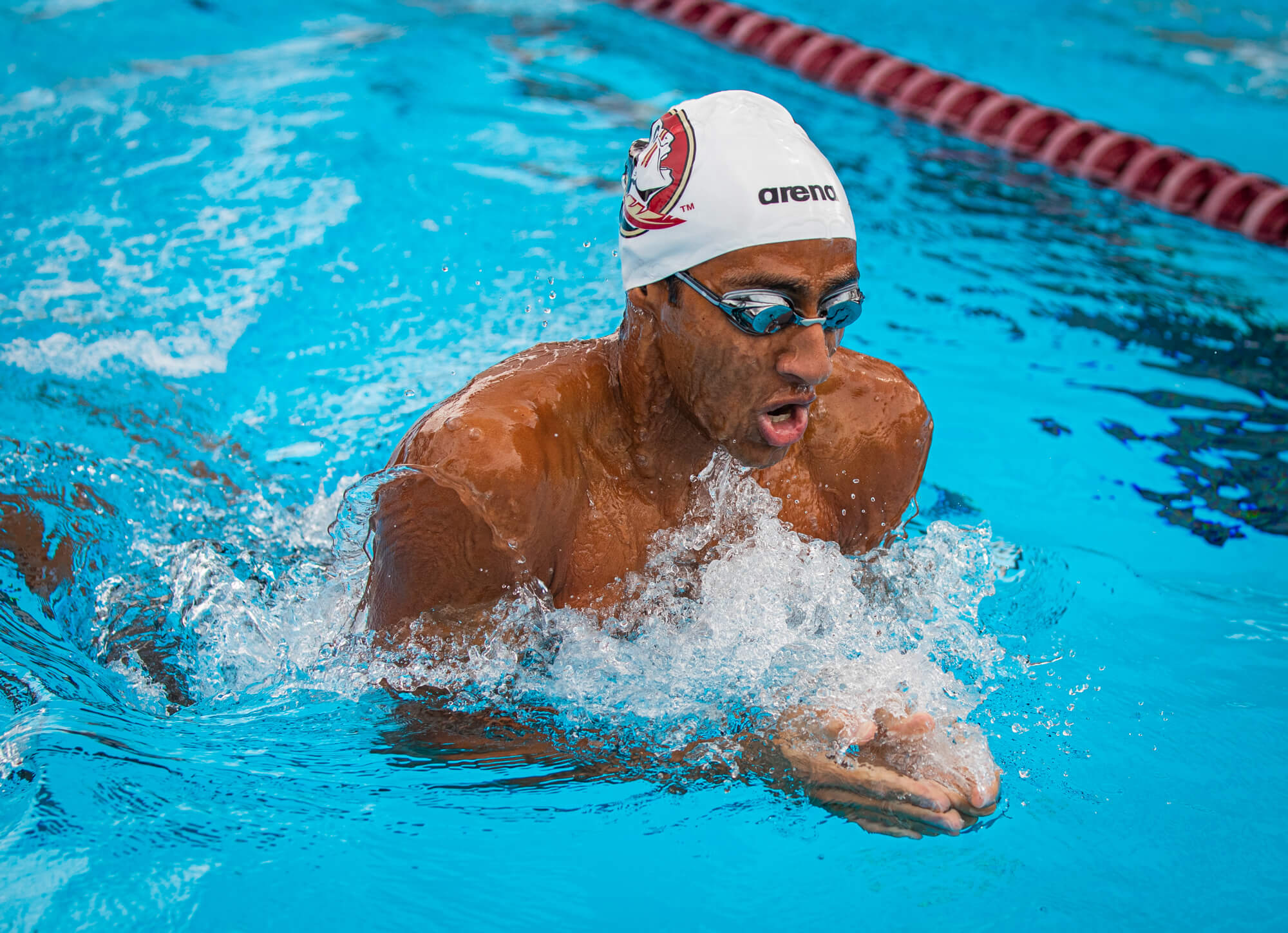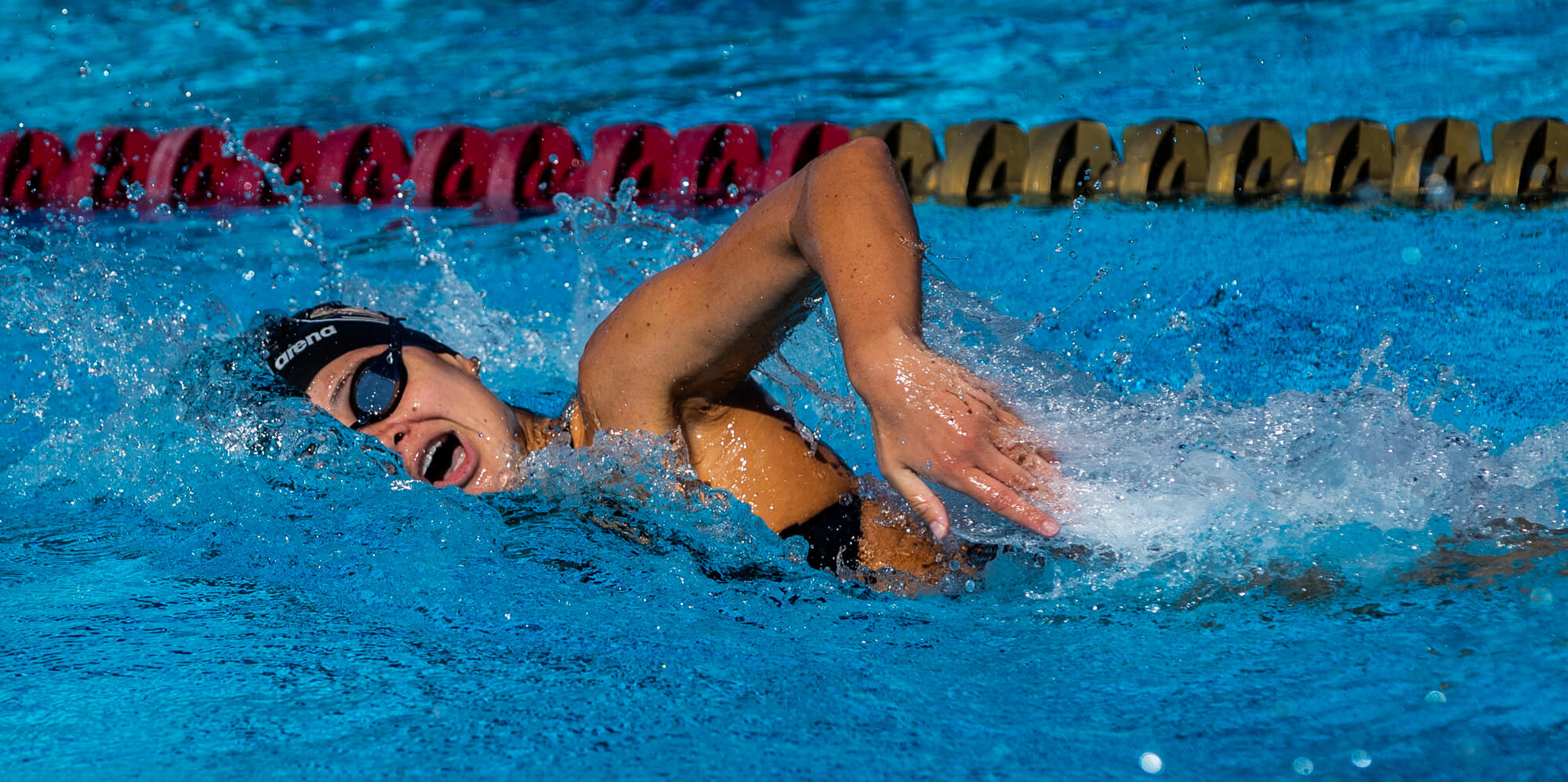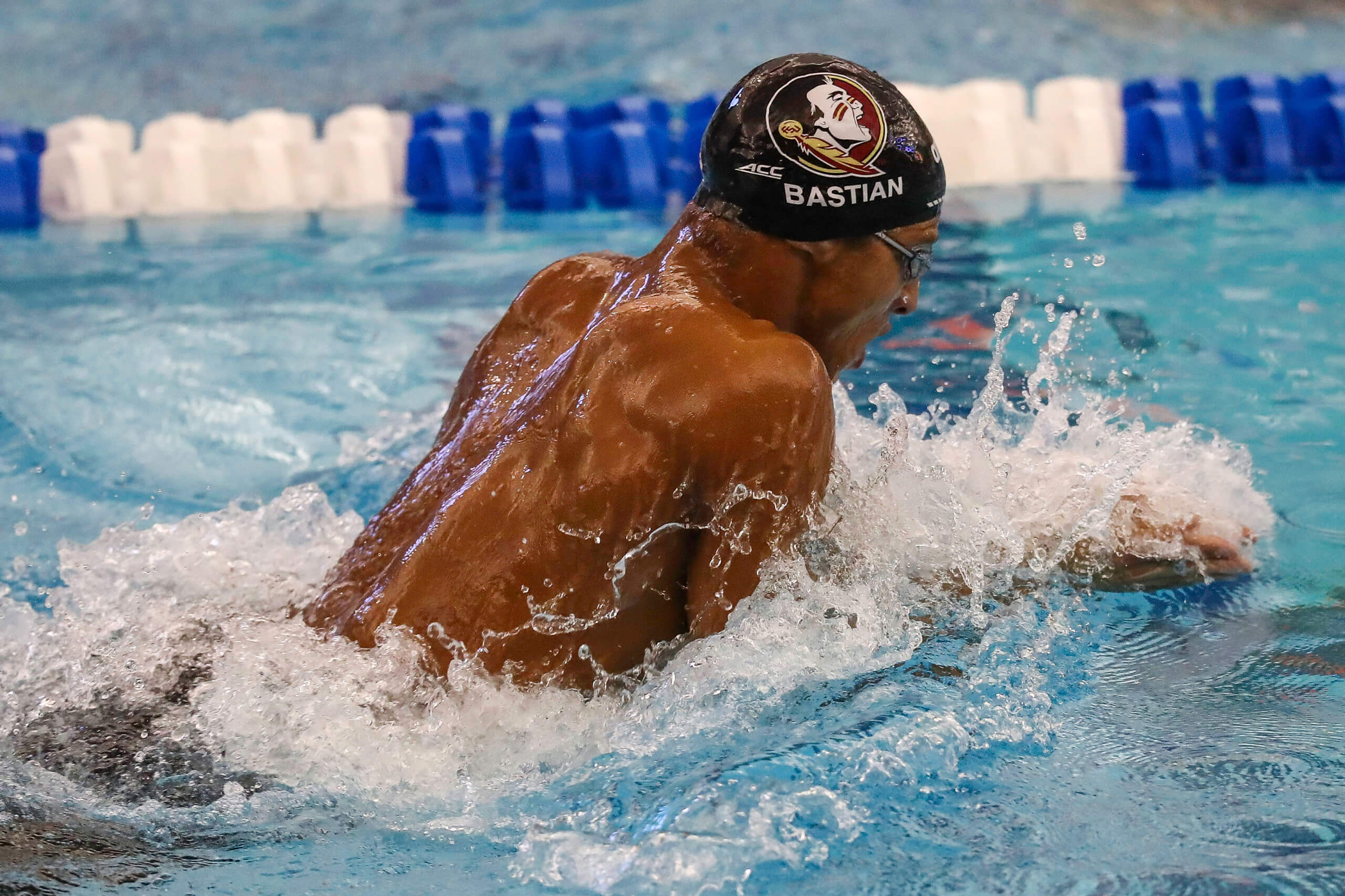Lauren Hew, Izaak Bastian Trace Path to Caribbean Stardom via Florida State

Editorial content for the 2021 Tokyo Olympic Games coverage is sponsored by GMX7.
See full event coverage. Follow GMX7 on Instagram at @GMX7training #gmx7

Lauren Hew, Izaak Bastian Trace Path to Caribbean Stardom via Florida State
Lauren Hew has represented the Cayman Islands at international meets since she was 14 years old. Through two Commonwealth Games and five World Championships (three long-course), she’s gotten used to being one of the few members of her team, accustomed to what it takes to blend into the larger groups on deck or during warmups.
Since she was 15, there’s been at least one familiar face she can expect to see, even if he’s not wearing Cayman colors.

Izaak Bastian; Photo Courtesy: Florida State Athletics
Hew and Izaak Bastian have traveled similar paths to get to their junior years at Florida State. Both represent small island nations, Bastian calling the Bahamas home. Both travel to many of the same meets, from the regional Caribbean contests to events bringing together remnants of the British empire, ascending to the cream of the competitive crop of their nations from their mid-teens. Both attended Saint Andrew’s School in Florida, Hew as a boarder, Bastian as a native of Boca Raton.
And both juniors could go from spending the spring in Tallahassee to the summer in Tokyo, representing their countries on the international stage.
The commonalty of their paths is something they’ve grown to appreciate.
“I knew (Bastian) and there were a couple of other Caribbean kids that were at the same boarding school that were swimmers,” Hew told Swimming World. “Even just going into boarding school, they made is so much easier and made it feel more like home. Swimming high school with them and getting to travel across the Caribbean to meets with them was so much fun. And to go to Florida State, we have each other to kind of go through the process with, starting college swimming and a lot of the times, we go to big meets and we have each other to hang out with.
“It’s awesome to have him kind of along the journey with me.”
Marooned since March
The athletic challenges of 2020 haven’t been easy on anyone. The distance separating Hew and Bastian from their home countries have added complications.
Hew figured she’d be back in the Cayman Islands for a few weeks when she returned in March. She’s been home ever since, the territory’s airports closed to all but repatriation flights. Hew hopes to be on one of the first flights out in January to Miami, but she’s missed the fall portion of Florida State’s season.

Photo Courtesy: Florida State Athletics
In the longest stretch she’s been back home since starting at Saint Andrews, Hew is one of the oldest swimmers around, making it hard to ramp up her training. That’s a departure from her time in high school under legendary coach Sid Cassidy, who she credits with not just fostering the open-water sensibilities that come naturally but also understanding the international demands on training and competition for her and Bastian, and certainly from the immersive work she’s able to put in at Florida State.
Facilities in the Caymans aren’t conducive to the kind of training she’s used to, so she’s had to get creative to make the extra year to Tokyo work for her.
In the Caribbean, that means turning to open water. She’s taken to triathlons, joining with her friend Dominic Dyer, a senior track & field runner at Columbia likewise separated from college (in his case, due to the Ivy League’s cancellation of the winter season). Hew has taken part in open-water races, winning one in October. In June, she and two others did an 8.46-mile triathlon capped by a one-mile swim to protest racial injustice in the United States, the number signifying the amount of time that George Floyd was pinned to the ground by a Minneapolis police officer leading to his death.
Simplicity in her routine hasn’t been a drawback.
“As soon as I got home in March, the pools closed down,” she said. “I’ve been swimming in the ocean a lot, and it’s just been nice to be in the water pretty much every day.”
Hew has made it work. A sprinter by trade, she was in the mix for the Seminoles relays last year. She swam the 50 and 100 free at the 2019 World Championships in Gwangju as well as on the 400 mixed relay. That swim opens the possibility for a universality spot in the Tokyo Olympics, and it’s how she’s gotten to her impressive array of international meets.
Back from the Bahamas
The NCAA shutdown last spring hit Bastian a little harder. As a freshman, the breaststroke specialist had been part of Florida State’s 200 medley relay that finished seventh at NCAAs and third at ACCs. He also swam in the 400 medley relay at NCAAs.
As a sophomore, he was supposed to swim both relays, each silver medalists at the conference championships, as well the 100 breast, fresh off a personal-best 52.36 at ACCs.
While that change was disappointing in the moment, hindsight has softened the blow.

Izaak Bastian
Photo Courtesy: D’Vel Photo/Jeremy Esbrandt via Florida State Athletics
“I was a lot more disappointed when I first found out it wouldn’t happen,” Bastian said. “I was really excited. Being a sophomore and being able to make NCAAs in an individual event was a big deal for me. I was very happy about it. But once I took a step back and realized what was going on around me, I kind of got over it, honestly. I realized there are bigger things in the world, and this is one of them. I’ve got to roll with the punches.”
Bastian’s focus soon shifted. He went home to the Bahamas for part of the summer but was able to return to Tallahassee, first thinking he’d have at least one in-person class but happy to be with the team even when that went online. He’s competed in the fall segment of the schedule, and while it hasn’t translated into personal-bests, he’s happy. He doesn’t feel “as deep” in his training yet, but given the lull of last spring, it could be much worse.
Bastian’s path to the Olympics is less certain. He competed in the 50 and 100 breast at Worlds last year, the latest in a spate of international meets. For Bahamas, the men’s universality spot likely comes down to either he or sprinter and his good friend Jared Fitzgerald, formerly of Indiana and now the University of Tampa.
If this year has taught him anything, whether at Florida State or international competition, it’s to not look too far ahead.
“I’m trying to take it day by day because literally things change every week but you just don’t know until it happens and you can’t plan too much,” he said. “My focus right now is, show up for practice and do my best, but then I know I’m going to have to perform at some point next year. I know it would be a good idea to have a set date, but even if I said, ‘I’m going to go to this meet in March,’ who knows if that meet is going to happen? So I would rather not really focus too much on the long term and get disappointed when that meet doesn’t happen and I had a whole plan built around it only for it to fall apart.
“Right now, I think I’m learning to adapt better and take it day by day and work with what we have at this moment, because that’s all we have that’s guaranteed.”
Both Hew and Bastian carry a profile in their home countries that not many of their Florida State mates can relate to. Even if they aren’t necessarily the fastest on the team, their nationalities offer chances to shine internationally that many Americans won’t get.
Bastian says it’s not something they talk to much about, he and Hew not wanting to accentuate the pressure of it and instead sharing a more silent understanding. But through their experiences, for nearly a half-decade now, they’ve seen it first hand with each other.
“I think it’s just having a friend there, not going there without anybody you don’t already know,” Bastian said. “Even though I’m traveling with Team Bahamas and I know the people on those teams, it’s still a little different to have somebody that you see every day there. It feels a little more comforting. Obviously I know the guys and girls from Team Bahamas, but I don’t see them every day. So having someone like Lauren there is always a good experience.”




